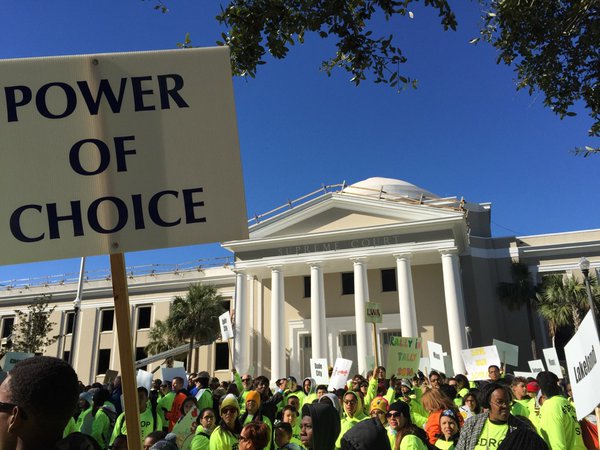
![]() Editor’s note: Misinformation abounds across the education choice landscape, adding confusion to an already complex issue. The redefinED team is dedicated to shining a light and providing the facts. Today’s post debunks a long-standing misconception: The state constitution says free public schools are the sole means for the state to provide education in Florida. You can see more myth busting here, or click the link at the top right-hand corner of this page.
Editor’s note: Misinformation abounds across the education choice landscape, adding confusion to an already complex issue. The redefinED team is dedicated to shining a light and providing the facts. Today’s post debunks a long-standing misconception: The state constitution says free public schools are the sole means for the state to provide education in Florida. You can see more myth busting here, or click the link at the top right-hand corner of this page.
The primary reason the Florida Opportunity Scholarship program was struck down 13 years ago was noticeably absent from recent news coverage of a potential lawsuit over Florida’s newest voucher program. Instead, discussions focused on issues of regulatory “uniformity,” and “separation of church and state,” the latter of which wasn’t part of the Florida Supreme Court’s ruling at all.
The primary legal reasoning, which is based on the “paramount duty” clause of Article IX Section 1 of the state constitution, isn’t easy to understand. The court had to invent prohibition where none existed, and it did so after misinterpreting another legal case.
Ironically, the Florida Supreme Court initially rejected the “paramount duty” argument before reversing itself five years later in what the Harvard Law Review called an “adventurous reading and strained application” of Florida’s constitution.
In Bush v. Holmes in January 2006, the Florida Supreme Court struck down the Opportunity Scholarship, reasoning it “diverts public dollars into separate private systems parallel to and in competition with the free public schools that are the sole means set out in the Constitution for the state to provide for the education of Florida’s children.”
But how did the court determine public schools were the sole means by which the state could provide education?
The court relied on the second and third sentences of Article IX, Section 1(a) of the state constitution:
It is, therefore, a paramount duty of the state to make adequate provision for the education of all children residing within its borders. Adequate provision shall be made by law for a uniform, efficient, safe, secure, and high-quality system of free public schools that allows students to obtain a high quality education…
No one is likely to read the language above and conclude vouchers are unconstitutional.
Most of Article IX, Section 1 was added to the state constitution by Amendment 6 in 1998, which was a response to public school advocates losing a funding adequacy lawsuit. As Justice Kenneth Bell noted in his dissent in Bush v. Holmes, there is no historical evidence the amendment was ever intended to be weaponized against school vouchers.
To justify prohibiting vouchers and declaring public schools the “sole means” of education, the court invoked “expressio unius,” which means, “the expression of one thing implies the exclusion of another.”
According to Irina Manta, writing in the St. Louis University Law Journal, the Florida Supreme Court, “appears to base its entire understanding of expressio unius on a quote from a statement in the 1927 Weinberger v. Board of Public Instruction decision.”
The Weinberger case dealt with constitutional language that specified “any bonds” issued for the purpose of funding public education “shall become payable within thirty years from the date of the issuance.” Similar language still exists today.
But in Weinberger, a school district had issued bonds that matured after the maximum 30-year period prescribed by the constitution. The 1927 court struck down the district’s bonds as unconstitutional, noting that the constitution mandated a maximum date by which bonds must be payable. Anything later than 30 years was thus prohibited.
According to Manta, “the relevant provisions in Holmes contain no prohibitions; in fact, they contain no language whatsoever that even comes close to Weinberger’s ‘any bonds.’”
The prohibition is clear in Weinberger, but not at all clear in Article IX, Section 1.
Justice Bell concluded in his dissent, “The clear purpose behind Article IX is to ensure that every child in Florida has the opportunity to receive a high-quality education and to ensure access to such an education by requiring the Legislature to make adequate provision for a uniform system of free public schools. There is absolutely no evidence before this Court that this mandate is not being fulfilled.”
Sadly, for the nearly 800 students on the Opportunity Scholarship at the time, the Florida Supreme Court invented a prohibition where none existed and did so entirely by misunderstanding a legal case from nearly a century before. Given this, it is easy to see why school choice critics omit the “paramount duty” clause when discussing the constitutionality of vouchers in Florida.


